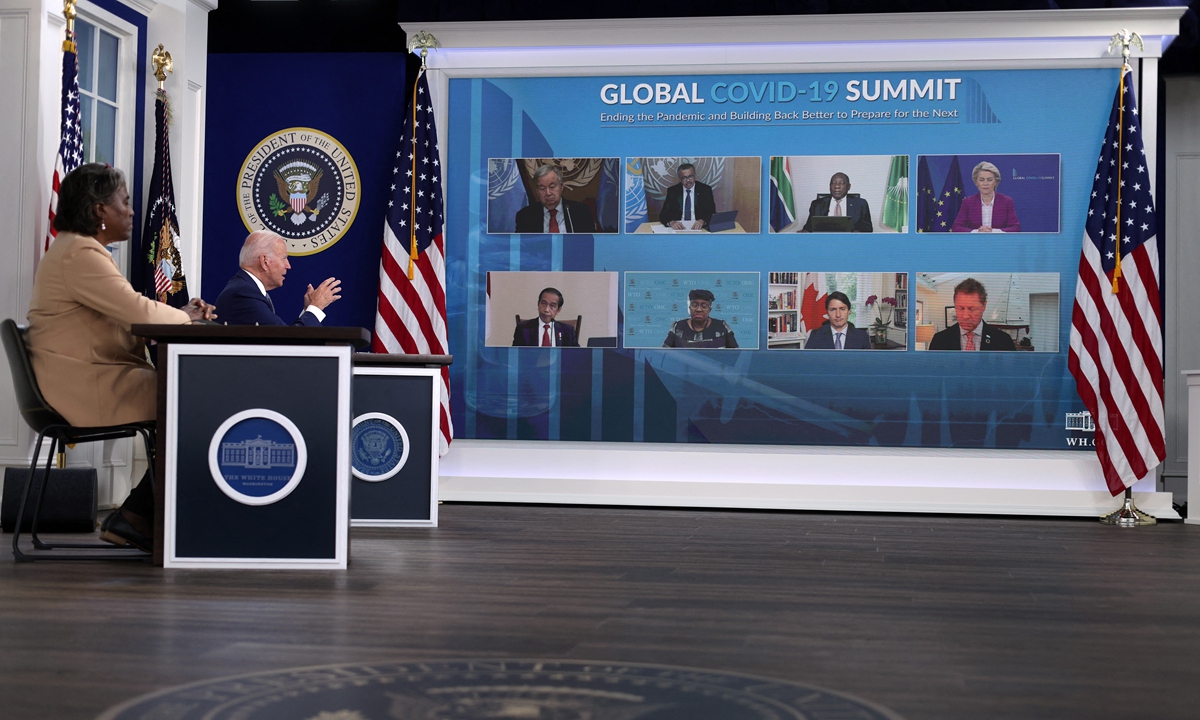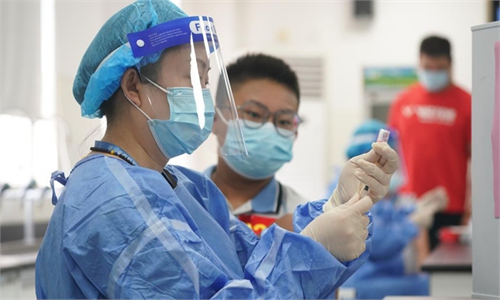
US President Joe Biden speaks as US Ambassador to the U.N. Linda Thomas-Greenfield listens during a virtual COVID Summit of the United Nations General Assembly at the South Court Auditorium at Eisenhower Executive Office Building on Wednesday in Washington, DC. Photo: AFP
More and more signs indicate that the so-called US global leadership is steadily weakening. In an eagerness to show "America is back," although the US has become one of the worst performing countries in the COVID-19 fight, US President Joe Biden still held the Global COVID-19 Summit on Wednesday on the sidelines of the UN General Assembly (UNGA). Despite Washington had declared that "over 100 countries, over 100 organizations" would attend the summit, it turned out that only a few countries and organizations participated, including Canada, the EU and South Africa. This is a manifestation of the current lame condition of the "US global leadership."
Nonetheless, Biden still made some ambitious promises during the summit. Biden announced the goal of vaccinating 70 percent of the global population within the next year, and he also pledged 500 million more doses of vaccine donations for developing countries, calling on leaders to elevate global ambition to end the COVID-19 pandemic in 2022.
However, it may be difficult to turn Biden's commitments into reality. According to Our World in Data, a scientific online publication that focuses on large global problems based at the University of Oxford, 79 percent of vaccine shots worldwide have been administered in high-income and upper-middle-income countries and only 0.5 percent of doses have been administered in low-income countries. But the participants of the summit were mostly US allies and partners, lacking the attendance and discussion of leaders from low-income countries. The results of the summit may be very limited.
"By holding such a summit, the US is trying to gather its partners and allies to form an exclusive alliance in the COVID-19 fight. Although Washington has tried to restore its damaged global leadership and national influence due to its messed-up fight against the epidemic, only a few countries attended the summit. This shows that the current condition of US global leadership may be even worse than Washington had imagined," Zhang Tengjun, deputy director of the Department for Asia-Pacific Studies at the China Institute of International Studies, told the Global Times.
It is also doubtful whether the Biden administration can really fulfill its promises. According to the World Health Organization, only 15 percent of the promised donations of vaccines from rich countries have been delivered by far, not to mention Biden's long-declared pledge to make the US the world's vaccine "arsenal."
On June 3, Biden promised to send a projected 80 million COVID-19 vaccine doses to other countries by the end of June, but the US dragged on until August to fulfill such commitment. The US also announced 80 vials of vaccine donated to Trinidad and Tobago in June, a country of 1.4 million people, drawing a storm of criticism and mockery.
Worse, Pfizer raised the price of its COVID-19 vaccine by more than one-quarter and Moderna by more than 10 percent in the EU supply contracts in August.
If such a trend goes on, it will seriously affect the positioning of vaccines as a global public product, as well as the popularity of vaccines in low-income countries, making it even harder for these countries to obtain vaccines. Chilean President Sebastian Pinera said during the UNGA that the "triumph" of speedy vaccine development was offset by political "failure" that produced inequitable distribution.
"This is a summit with very strong political implications, so it is unlikely to reach influential results in terms of global COVID-19 fight. In essence, it was an event whose political meanings were far greater than the realistic ones," Zhang said.
More and more countries are aware that most US promises are like rubber checks. Washington wants to make itself benefit by taking advantage of the common challenges facing the world. The summit will not produce the transformative result to end the pandemic, and simply relying on the seemingly noble commitments will do only harm to the global COVID-19 fight.


